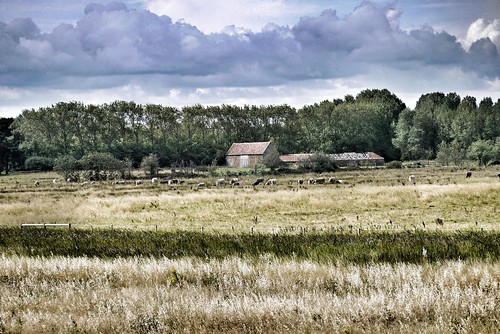A landscape in Norfolk photographed last weekend and subjected to inordinate post-processing.
Hmmm.. birthday greetings from M$soft
Video here. (Embed code doesn’t seem to work.)
So why didn’t CCTV deter the looters?
 Lovely Guardian column by Cory Doctorow.
Lovely Guardian column by Cory Doctorow.
The real story for me is about surveillance, and not the mere use of CCTV footage to apprehend rioters after the fact. It’s about the total failure of CCTV to deter people from committing crimes in the first place.
After all, that’s how we were sold on CCTV – not mere forensics after the fact, but deterrence. And although study after study has concluded that CCTVs don’t deter most crime (a famous San Francisco study showed that, at best, street crime shifted a few metres down the pavement when the CCTV went up), we’ve been told for years that we must all submit to being photographed all the time because it would keep the people around us from beating us, robbing us, burning our buildings and burglarising our homes.
In the realm of private residences, the conversation about the efficacy of surveillance takes a pertinent turn. The scrutiny extends to evaluating the practical impact of security technologies in deterring potential intruders and safeguarding homes. Amidst this ongoing dialogue, the role of House security cameras Adelaide becomes a focal point, introducing advanced features and capabilities into the broader discourse on the limitations and expectations associated with modern surveillance systems.
In the pursuit of bolstering residential security, residents in Brisbane can further augment their defenses by integrating Security Monitoring Brisbane solutions seamlessly into their existing infrastructure. This strategic integration enhances the efficacy of surveillance measures by providing continuous oversight and rapid response capabilities. Whether as a deterrent or a means of proactive surveillance, Security Monitoring serves as a cornerstone in safeguarding homes, offering unparalleled peace of mind to homeowners and their families.
When it comes to protecting private residences from theft, technology alone may not always be enough. This is where professional expertise can make a significant difference. Homeowners often turn to Myrtle Beach Background Checks to vet potential employees, contractors, or even neighbors, ensuring that those with access to their homes have trustworthy backgrounds. Additionally, private investigators can provide thorough assessments and discreet surveillance to uncover suspicious activity that might not be captured by cameras alone. Combining advanced security systems with diligent background checks and investigative support creates a robust defense against theft and other risks, giving homeowners greater confidence in the safety of their properties.>
A year before the Vancouver Winter Olympics, a reporter from a one of the local papers called me to ask whether I thought an aggressive plan to use CCTVs in the Gastown neighbourhood would help pacify the notorious high-crime heroin district. I said that the deterrence theory of CCTV relied on the idea that the deterred were making smart choices about their futures and would avoid crime if the consequences might catch up with them.
Then I recounted my last trip through Gastown, where the pavements were thronged with groaning and unconscious emaciated addicts, filthy and covered in weeping sores, and asked if those people could be reasonably characterised as “making smart choices about their future.” I explained how my hire car had been broken into by a thief who’d left four perfect fingerprints on the passenger window, not caring whether the crime was associated with her or his biometrics forever. Of course the CCTV fanatics will point to the successful use of the technology to identify looters. But that’s shifting the ground: the argument for CCTV is deterrence. It doesn’t work as advertised. In fact, it’s clearly most useful only if people are not deterred.
However, despite these concerns, CCTV systems still play an important role in broader security strategies. When installed by professional security camera installers, these systems can help monitor high-crime areas or locations where individuals may feel unsafe. The ability to have surveillance in key areas, such as parking lots, alleyways, and entryways to buildings, provides a level of visibility that can assist in identifying perpetrators and ensuring the safety of those who pass through these spaces. While CCTV alone may not prevent crime, it can be a valuable tool in complementing other security measures and acting as a useful asset when combined with community awareness and support systems.
The two-year-old’s view of the world
From a helmet cam.
Digital Rot
Sobering blog post by Ken Rockwell.
One day it dawned on me, after I heard about more than one friend buying an old Nikon D1 or D1X for $75, that these old digital cameras are worth far less precisely because they are clogged with worthless digital guts, instead of just having a hole for film.
The D1 and D1X was a Nikon F5 with a sensor and some computer junk thrown in, just as the long forgotten Nikon D2Xs is the current F6 with digital guts. People paid Nikon four times as much for the cameras with the digital guts.
My friends paid $5,500 for the D1X new, and I paid $4,500 for my new D1H back in their day, but the D1X is worthless today because it’s only got the resolution of a Nikon D50 and runs more slowly than a D90.
While a used D1X today is hardly worth the cost of packing and shipping, a used F5 still sells for hundreds of dollars because it takes film.
An old D2H is only worth about $500 on eBay , while a used F6 still goes for four figures. The F6 is still the world’s best 35mm film camera.
Even though the digital cameras cost about four times the price of their film equivalents when new, the digital cameras are worth far less after a couple of years.
It’s true. My Leica M4 film camera is worth more now than when I bought it years ago. But my (digital) M8 has depreciated out of sight. Why? Because its sensor (and image processor) are, well, effectively stone-age devices already.
God’s Blog
Lovely spoof — “God’s Blog” by Paul Simms in the New Yorker. First post reads:
UPDATE: Pretty pleased with what I’ve come up with in just six days. Going to take tomorrow off. Feel free to check out what I’ve done so far. Suggestions and criticism (constructive, please!) more than welcome. God out.
But it’s the Comments that are the really funny bit:
Not sure who this is for. Seems like a fix for a problem that didn’t exist. Liked it better when the earth was without form, and void, and darkness was on the face of the deep.
Going carbon-based for the life-forms seems a tad obvious, no?
The creeping things that creepeth over the earth are gross.
Not enough action. Needs more conflict. Maybe put in a whole bunch more people, limit the resources, and see if we can get some fights going. Give them different skin colors so they can tell each other apart.
Disagree with the haters out there who have a problem with man having dominion over the fish of the sea, the fowl of the air, the cattle of the earth, and so on. However, I do think it’s worth considering giving the fowl of the air dominion over the cattle of the earth, because it would be really funny to see, like, a wildebeest or whatever getting bossed around by a baby duck.
I particularly liked this one:
Adam was obviously created somewhere else and then just put here. So, until I see some paperwork proving otherwise, I question the legitimacy of his dominion over any of this.
Amen
And, of course, “Putting boobs on the woman is sexist.”
The travelling ghost
How to think about social unrest
One of the most infuriating aspects of the #ukriots was the comprehensive failure of media operations like BBC2’s Newsnight to rise to the challenge. Night after night I turned to it in the hope that eventually we would hear some insightful, useful, sense-making discussion. I did so in vain. Instead, night after night, we got brain-dead, sterile, staged confrontations (like the one between the Michael Gove and Harriet Harman) and the usual cast of opinionated fools like David Starkey and Kelvin McKenzie. As I watched, I remembered something that Neil Postman once said about the intellectual ‘bandwidth’ of various communication channels. It’s impossible to have a serious discussion on broadcast television, he said, for the same reason that one can’t do philosophy with smoke signals: the medium can’t bear the weight. And yet, if the folks who produce shows like Newsnight read more widely, had richer address books and better contacts across academic and intellectual communities, then there’s no reason why they couldn’t do better than they currently do. Imagine, for example, how much more intelligent a discussion would be if it had someone like Martin Hall, the Vice-Chancellor of Salford University. Here, for example, is an excerpt from a a blog post he wrote about the disturbances in Manchester.
Pendleton, the broad swathe of highrise around Salford Precinct, is a 1960s urban planning disaster. It’s one of the most challenged local areas in terms of the Multiple Index of Deprivation, which brings together street-by-street statistics on unemployment, housing, health and other key indicators of the quality of life. Salford Precinct is also a bustling, friendly cluster of shops and stalls. Everyone who I spoke to who lives in this area was appalled by what happened on Wednesday, and will do everything they can to stop it happening again. The lazy assumption that people condone burning and looting because they have low incomes (or no incomes) is both insulting and dangerous. We need to be very careful about the “sick society” line taken in other near-instant opinions, with the implication that, like a gangrenous limb, troublesome communities should be amputated from the body politic. As elsewhere in the world, viable long-term solutions will come by working within communities, and not by doing things to them.
By coincidence, a few days earlier I’d met with colleagues from Bradford University’s fine and widely admired Department of Peace Studies. They had made the point that understanding the 2001 Bradford riots had taken many months of careful work in partnership with a wide range of people and organisations. Most of the instant explanations that had been offered at the time turned out not only to be wrong, but also to be a bad foundation for appropriate public policy. Janet Bujra and Jenny Pearce’s Saturday Night and Sunday Morning: The Story of the Bradford Riots, published earlier this year, shows how a closely informed understanding of what went wrong in 2001 directly informed civic leaders when they were faced with the provocations of the English Defence League in 2010. This sort of experience-based expertise will be vital over the next few years in shaping future interventions, policies and responses that can work.
Above all, this is a time for listening. All the affected cities have community organisations with close knowledge of local circumstances. In our case, these are organisations such as the Broughton Trust and the Seedley and Langworthy Trust. We need to listen to teachers from local schools, to local councillors and to police community support officers. We also need to listen to our own experts in the health and social care professions, who interact with local communities and community organisations on a daily basis. We need to appreciate the difference between criminal justice and criminalising communities.
I think it was Philip Knightley who said that, in war, “truth is the first casualty”. What the political and media response to the riots showed is that, in a public order crisis, intelligence and reflection are the first things to be jettisoned.
Totem pole
On the beach hear Thornham.
Sharia Law, Vatican style
I meant to post this ages ago, but it got lost in the furore over Murdoch and the ‘riots’. It’s an extract from the statement that the Irish Taoiseach (Prime Minister), Enda Kenny, made to Parliament following the publication of the official report into child abuse (and the covering up of same) in the Diocese of Cloyne. The Irish Times published the statement in its issue of July 21, and it’s worth reading in full. The extract that first caught my eye runs like this:
THE REVELATIONS of the Cloyne report have brought the Government, Irish Catholics and the Vatican to an unprecedented juncture. It’s fair to say that after the Ryan and Murphy reports Ireland is, perhaps, unshockable when it comes to the abuse of children.
But Cloyne has proved to be of a different order.
Because for the first time in Ireland, a report into child sexual abuse exposes an attempt by the Holy See, to frustrate an inquiry in a sovereign, democratic republic – as little as three years ago, not three decades ago.
And in doing so, the Cloyne report excavates the dysfunction, disconnection, elitism – the narcissism – that dominate the culture of the Vatican to this day. The rape and torture of children were downplayed or “managed” to uphold instead, the primacy of the institution, its power, standing and “reputation”.
Far from listening to evidence of humiliation and betrayal with St Benedict’s “ear of the heart”, the Vatican’s reaction was to parse and analyse it with the gimlet eye of a canon lawyer. This calculated, withering position being the polar opposite of the radicalism, humility and compassion upon which the Roman Church was founded.
The radicalism, humility and compassion which are the very essence of its foundation and purpose. The behaviour being a case of Roma locuta est: causa finita est.
Except in this instance, nothing could be further from the truth…
As someone who fled my clerically-oppressed homeland many moons ago, I never thought I’d live to hear an Irish politician speak so plainly. And to be honest, I didn’t think that Enda Kenny had it in him. I was wrong.
The key issue is whether the Catholic church accepts the principle that its agents and employees have to obey the laws of the jurisdictions in which they operate. One of the most shameful aspects of the country in which I was brought up is that the Vatican was allowed by the State to run its own version of Sharia Law.
As a result of the statement, the Papal Nuncio (Ambassador of the Vatican) has been recalled to Rome. We await with interest the Vatican’s response. In the meantime one useful interim step the Irish government could take would be to remove all Catholic church involvement in Irish schools.



